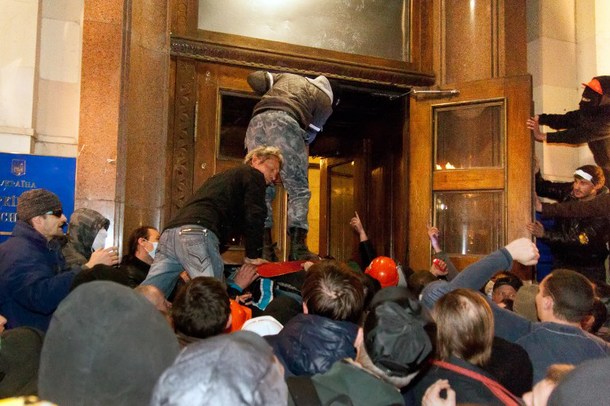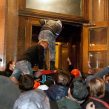
Russia Builds Leverage Ahead of Ukraine’s Presidential Election
Publication: Eurasia Daily Monitor Volume: 11 Issue: 68
By:

Moscow seems to be preparing the atmosphere for a possible military intervention in Ukraine’s eastern regions. Russia could, if it deemed expedient, intervene there with troops in some form or other, as it has just done in Crimea. But, more likely, Moscow would leverage the threat of intervention, in order to extract political concessions from Ukraine and the United States, ahead of Ukraine’s May 25 presidential election (see below).?
Russia is starting to build a political case for exercising oversight rights on a “federalized” Ukraine via the country’s eastern regions. Russia has the capacity to destabilize Ukraine’s east, unless the government in Kyiv commits to accepting Moscow’s proposals for a new constitution of Ukraine, centered on “federalization.”
Following the regime change in Kyiv, the Kremlin has (at least temporarily) withdrawn the economic incentives through which it had influenced the predecessor Ukrainian government (gas price discount, stabilization loans). Moscow is using coercion, not incentives with the new government of Ukraine. The Kremlin has built this coercive power in four quick steps.
In the first step, Russian President Vladimir Putin had the Federation Council authorize him to use military force to protect the “Russian-speaking population” in Ukraine. That authorization is not limited to Crimea, and is valid from March 1 onward for an open-ended duration—potentially a “sword of Damocles” on Ukraine. The second step saw the massive deployment of Russian forces along Ukraine’s eastern borders, raising the prospect of a snap cross-border intervention.
In the third step, Russia’s state television channels took to inciting separatism in Ukraine’s eastern regions. Along with “political tourists” infiltrating from Russia, inflammatory televised propaganda destabilized parts of eastern Ukraine. And in the latest, fourth step, Moscow is exploiting the unrest it has itself incited, attempting to de-legitimize the Ukrainian state as such.
On April 6, violent pro-Russian demonstrators stormed and seized the regional state administrations’ (governors’) buildings in Donetsk and Kharkiv, as well as the state security service’s (SBU) buildings in Donetsk and Luhansk. In the three cities, “people’s republics” or “people’s soviets [councils]” were proclaimed under Russian and Soviet banners and symbols; the holding of referendums on “federalization” was demanded; appeals were voiced to Putin and the deposed Ukrainian president Viktor Yanukovych to take over; and attempts were made to form pro-Russia paramilitary groups. The central government managed to restore its authority at least temporarily in Kharkiv, but not yet in the other two cities.
In a statement reflecting his close relationship with the Kremlin, Duma deputy Vyacheslav Nikonov warned: “If Kyiv deploys troops, or uses special-purpose forces, then that could lead to intervention by Russia. Russia might agree to send troops into Ukraine if a people’s soviet [council], such as that in Donetsk, asked it” (RIA Novosti, April 7). Such statements are designed in part to encourage secessionist tendencies in Ukraine’s east while preserving plausible deniability for Russia’s government.
Russia’s state television channels have poured oil on the fires. The three channels hailed those protesters’ demands, encouraged eastern Ukraine’s Russians and “Russian-speakers” to exercise a right of “self-determination” vis-à-vis Ukraine, urged them to reject the government in Kyiv as illegitimate, and played on their irrational prejudices by claiming that Ukrainian police, Right Sector “fascists,” and American security contractors were all “converging” on eastern Ukraine to suppress the protests at the risk of a civil war (Russian TV Channel One, Rossiya 1 TV, NTV, April 7, 8).
This, on the whole, has been the tenor of Russian state television ever since the regime change in Kyiv. Following the latest riots (see above), however, Moscow crossed a new line, showcasing a few gunmen and would-be leaders of paramilitary groups in eastern Ukraine. The self-styled leader of an “Army of the Southeast” and one of his subordinate “commanders” were featured in brief interviews (Rossiya 1 TV, April 7); while the State Duma unanimously adopted a statement honoring the initiator of a paramilitary group from Luhansk and four other protest leaders (RIA Novosti, April 4). Such political gestures can significantly embolden secessionist groups in eastern Ukraine.
On top of military pressure and political subversion against Ukraine, the Kremlin holds two additional levers against the Ukraine–United States tandem. These levers are, first, Moscow’s non-recognition of the new Ukrainian government’s legitimacy; and second, Moscow’s capacity to block the holding of Ukraine’s May 25 presidential election in eastern Ukraine. A failed presidential election (i.e., without a substantial turnout in Ukraine‘s east) would definitively compromise the Kyiv government’s legitimacy. By the same token it might doom the Barack Obama administration’s policy to deal with Russia on Ukraine through the John Kerry–Sergei Lavrov channel.
Washington, and to a somewhat lesser extent Kyiv, seek a Russia-Ukraine meeting on the governmental level, which would signify Russia’s recognition of this Ukrainian government, ahead of the May 25 presidential election. By the same token, Kyiv and Washington need reassurance that Russia or its sympathizers would not block the presidential election in eastern Ukraine.
Ukraine and the US, facing that deadline, are in a hurry. Russia is not. According to Foreign Affairs Minister Sergei Lavrov (Interfax, April 7, 8), Moscow could offer recognition and those reassurances, provided that Kyiv would commit to the “principles” of federalization and the non-bloc status in a new constitution under a Russian droit de regard.




